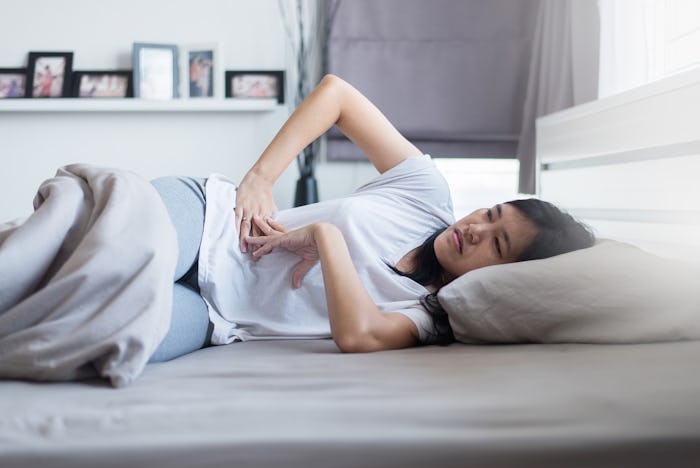Life
What Impact The Age You Got Your First Period Has On Your Mental Health
You may or may not remember the exact age that you got your first period, unless there was something about it that particularly stuck in your mind, but that seemingly unimportant fact about a moment in your life can actually have some long-reaching implications. Knowing what impact the age you got your first period has on your mental health is important. It could help you put some things into perspective or help you brace for (and take action) if you see warning signs ahead. There are a number of different things that can affect how likely (or unlikely) it might be that you'll develop a given condition — the age you got your first period is just one of the possible factors. Your risk level for all kinds of conditions, whether physical or mental, doesn't, of course, mean that you'll for sure develop any specific condition down the road, but some people like to be prepared and know what they might be more likely to experience before it actually happens.
Your first period is called menarche, in case you hadn't hear that before. Yes, your first period has its very own name. And, partially because there are so many hormone fluctuations that go along with getting your period each and every month (including when you got your first period), getting your first period earlier or later than most people can actually affect your health in a number of ways.
There are physical effects, sure, but there are also some important mental health effects that shouldn't be overlooked. When you get your period earlier than most of your friends, you've hit puberty sooner, which, in some cases, might mean that you look a bit more grown up sooner than you otherwise would. This, obviously, isn't a specific condition, but it can certainly impact your mental health. Dr. Frank M. Biro, MD, a professor in the University of Cincinnati department of pediatrics, told Splinter that if you look older than you are, people might treat you that way as well, but that your body may have matured more, while your mind may not have. It can be difficult to be treated as more adult when you're still young, particularly if you're being treated more like a woman than a girl.
Not only that, but getting your period sooner might also put you at a higher risk for developing an eating disorder. A 2013 paper published in Hormones and Behavior concluded that, for girls, reaching puberty at a younger age could potentially increase your risk not only for eating disorders, but also symptoms of eating disorders. Knowing that there's a potential link there is important, not only for young girls, but also for the adults in their lives.
Additionally, WebMD noted that HealthDay News reported that a 2017 study found that people who get their first periods earlier in their lives might be more likely to develop depression or other "antisocial behaviors" than those who get their first periods slightly later. The risk stays elevated until the women are at least in their 20s (or maybe longer), so that's pretty important for people to know. It's not just something that might happen soon after getting your first period, it's something that could happen many years after that.
If you got your first period relatively early, there is potentially some good news too. A 2016 study published in the Journal of the American Geriatrics Society found that those who got their first period before turning 13, used hormonal birth control for longer than a decade, or had their last baby after turning 35 had sharper mental faculties in older age than those who didn't. More research is likely needed regarding how the age you were when you got your first period might affect you later on in life, but the research has been done has found the potential for some important associations.
Even though you may have thought that it didn't really matter when, exactly, you got your period — other than thinking about potential implications for having kids or experiencing embarrassment if you got it before or after all of your friends — the age that you got your period and how long or how soon you were exposed to higher levels of certain hormones just might affect you for many years to come.
